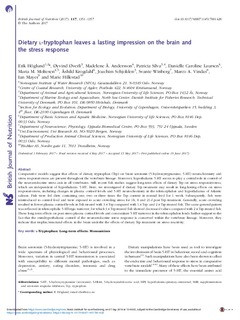| dc.contributor.author | Höglund, Erik | |
| dc.contributor.author | Øverli, Øyvind | |
| dc.contributor.author | Andersson, Madelene Åberg | |
| dc.contributor.author | Silva, Patricia | |
| dc.contributor.author | Laursen, Danielle Caroline | |
| dc.contributor.author | Moltesen, Maria M | |
| dc.contributor.author | Krogdahl, Åshild | |
| dc.contributor.author | Schjolden, Joachim | |
| dc.contributor.author | Winberg, Svante | |
| dc.contributor.author | Vindas, Marco Antonio | |
| dc.contributor.author | Mayer, Ian | |
| dc.contributor.author | Hillestad, Marie | |
| dc.date.accessioned | 2018-09-10T08:31:08Z | |
| dc.date.available | 2018-09-10T08:31:08Z | |
| dc.date.created | 2017-09-28T10:11:59Z | |
| dc.date.issued | 2017 | |
| dc.identifier.citation | British Journal of Nutrition. 2017, 117 (10), 1351-1357. | nb_NO |
| dc.identifier.issn | 0007-1145 | |
| dc.identifier.uri | http://hdl.handle.net/11250/2561639 | |
| dc.description.abstract | Comparative models suggest that effects of dietary tryptophan (Trp) on brain serotonin (5-hydroxytryptamine; 5-HT) neurochemistry and stress responsiveness are present throughout the vertebrate lineage. Moreover, hypothalamic 5-HT seems to play a central role in control of the neuroendocrine stress axis in all vertebrates. Still, recent fish studies suggest long-term effects of dietary Trp on stress responsiveness, which are independent of hypothalamic 5-HT. Here, we investigated if dietary Trp treatment may result in long-lasting effects on stress responsiveness, including changes in plasma cortisol levels and 5-HT neurochemistry in the telencephalon and hypothalamus of Atlantic salmon. Fish were fed diets containing one, two or three times the Trp content in normal feed for 1 week. Subsequently, fish were reintroduced to control feed and were exposed to acute crowding stress for 1 h, 8 and 21 d post Trp treatment. Generally, acute crowding resulted in lower plasma cortisol levels in fish treated with 3 × Trp compared with 1 × Trp- and 2 × Trp-treated fish. The same general pattern was reflected in telencephalic 5-HTergic turnover, for which 3 × Trp-treated fish showed decreased values compared with 2 × Trp-treated fish. These long-term effects on post-stress plasma cortisol levels and concomitant 5-HT turnover in the telencephalon lends further support to the fact that the extrahypothalamic control of the neuroendocrine stress response is conserved within the vertebrate lineage. Moreover, they indicate that trophic/structural effects in the brain underlie the effects of dietary Trp treatment on stress reactivity. | nb_NO |
| dc.language.iso | eng | nb_NO |
| dc.publisher | Cambridge University Press | nb_NO |
| dc.title | Dietary l-tryptophan leaves a lasting impression on the brain and the stress response | nb_NO |
| dc.title.alternative | Dietary l-tryptophan leaves a lasting impression on the brain and the stress response | nb_NO |
| dc.type | Journal article | nb_NO |
| dc.type | Peer reviewed | nb_NO |
| dc.description.version | publishedVersion | nb_NO |
| dc.rights.holder | © The Authors 2017 | nb_NO |
| dc.source.pagenumber | 1351-1357 | nb_NO |
| dc.source.volume | 117 | nb_NO |
| dc.source.journal | British Journal of Nutrition | nb_NO |
| dc.source.issue | 10 | nb_NO |
| dc.identifier.doi | 10.1017/S0007114517001428 | |
| dc.identifier.cristin | 1499426 | |
| dc.relation.project | Norges forskningsråd: 180013 | nb_NO |
| cristin.unitcode | 7464,20,15,0 | |
| cristin.unitname | Akvakultur | |
| cristin.ispublished | true | |
| cristin.fulltext | original | |
| cristin.qualitycode | 1 | |
